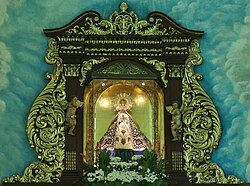Our Lady of Guidance
| Our Lady of Guidance Nuestra Señora de Guia Patroness of Overseas Filipino Workers |
|
|---|---|

The icon enthroned on its iconic pandan leaves.
|
|
| Location | Ermita, Manila, Philippines |
| Date | 19 May 1571 |
| Witness | Ferdinand Magellan |
| Type | Molave wood |
| Holy See approval | Pope Paul VI |
| Shrine | Our Lady of Guidance Archdiocesan Shrine |
| Patronage | Navigators, travellers, seafarers |
| Attributes | pandan leaves, open hands, marshal's baton, dark skin, Chinese features |
Our Lady of Guidance (Spanish: Nuestra Señora de Guia) is a 16th-century image of the Blessed Virgin Mary depicted as the Immaculate Conception that is widely venerated by Filipino Roman Catholics. The wooden Black Madonna is considered the oldest extant Marian statue in the Philippines, and is believed to have been originally brought to the islands by Ferdinand Magellan (along with Santo Niño de Cebú) in the early 16th century.
Locally venerated as patroness of navigators and travelers, the image is enshrined at the Our Lady of Guidance Archdiocesan Shrine, commonly known as Ermita Church, in the Ermita area of the City of Manila. The image was canonically crowned by the Papal nuncio on 30 December 1955.
Made of molave (Vitex cofassus) wood, the statue stands about 50 centimetres (20 in) and is characterized by dark skin and long, brunette hair. She is dressed in both a manto and a stylized tapis, the traditional wraparound skirt of Filipino women. Among her regalia is a sceptre, a set of jewels given by Archbishop of Manila Cardinal Rufino Santos in 1960, and a golden crown donated by Pope Paul VI during his visit to Manila Cathedral on May 16, 1971.
...
Wikipedia
